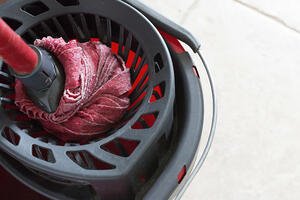This $117 billion U.S. business, which encompasses basic janitorial services, pest control, and other building maintenance, is huge but very competitive, comprised of mainly small operators, including 36,000 franchised outlets. Competitors run the gamut, from sole proprietors to giants such as ABM Industries with $6.5 billion in revenues. This is a low-investment business that’s easy to enter, and many do.
It’s a mixed bag this year for this industry. Some contractors who serve retail outlets, schools, and even commercial office spaces are seeing steep declines, requests for credits, withholding of payment, and facility closures, while others are booming as building managers scramble to do deep cleaning and more frequent cleaning.
Following are some things to know about this industry:
- Commercial cleaning industry size: Marketdata estimates that industry receipts will decline by 1.6% this year, due to COVID-19-related shutdowns and lost business, to a value of $117.3 billion. However, the recession is expected to be sharp but short-lived, with a 7.4% gain and recovery forecast for 2021, and 5.4% annual gains thereafter to 2025.
- Effects of COVID-19: The large and mid-sized cleaning contractors will be stimulated by the Coronavirus crisis—including disaster restoration firms. More facilities will need to be “deep cleaned” in the aftermath of the virus, and building managers will probably increase the frequency of cleaning to prevent future outbreaks. COVID-19 may well redefine the industry, with many small or heavily leveraged businesses shutting their doors.
- Competitors: The top 12 commercial cleaning services companies (mostly franchise systems) now operate 35,000+ U.S.-based units, and had combined sales of $13.5 billion. Franchise total start-up costs vary widely, and royalty rates equal 8% of net sales.
- End-user demand: 90% of contract cleaners service office buildings. Thanks to COVID-19, most office buildings across the larger cities are currently standing pretty much empty because employees are working from home. However, office space is typically leased for a longer period (usually five years), which means leases won’t be canceled just now because of the crisis.
- Workers: The industry employs 2.4 million workers. Salaries are low, there is high turnover, and there is no clear career path. Many workers, including recent immigrants, consider this to be temporary work until they find something better. Most workers earn less than $10/hr.
- Market Segmentation: Within the industry, the greatest share of the business goes to janitorial services. There are 60,219 janitorial service establishments, with total revenues of $50.4 billion, and average yearly revenues of $837,000. Pest control establishments number 14,465, with receipts of $13 billion.
Find Out More
Newly published in April 2020, The U.S. Commercial Cleaning Industry report by Marketdata traces the industry’s size, growth, trends, end-user demand, structure, operating ratios, and competitors. The report covers the impact of the Covid-19 crisis and a looming recession. It also includes in-depth findings and analyses of all the latest surveys by the Census Bureau, trade associations and trade magazines, as well as outlooks by other analysts and consultants.
View the report page on MarketResearch.com to read the full abstract and table of contents.

About the Author: John LaRosa is the President of Marketdata LLC and is the author of 100+ industry and market studies. His research appears in top media outlets including ABC, CNN, Fox, Forbes, USA Today, The Wall Street Journal, The New York Times, and a variety of trade journals.
